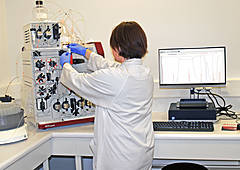Agro-Bio develops specific polyclonal ADAs (anti-drug antibodies) and NADAs (neutralizing anti-drug antibodies) on a fee-for-service basis, including characterization and stability management.
An ADA (anti-drug antibody) control for your immunogenicity testing

Biotherapeutics administration may induce immunogenicity in patients due to circulating anti-drug (ADA) antibody production. When the ADA present neutralizing (NADA) properties to the drug substance, their presence may lead to a loss of therapeutic efficacy.
To monitor the immunogenicity of candidate drugs, health agencies recommend developing a positive control reagent using polyclonal antibodies, as they are most representative of potential human immune response(1).
Key features of Ago-bio’s ADA critical reagents :
- Custom protocol in short lead time
- Critical Reagent characterization and stability assessment
- Retest of critical reagent at regular intervals
Our protocol includes robust immunization and a specific purification process tailored to each project, depending on the candidate drug and the method used to detect these ADAs.
We are able to handle all kinds of candidate drug formats: therapeutic antibodies, bispecific antibodies, biosimilars, proteins, etc.
(1)The European Medicines Agency (EMA) Committee for Medicinal Products for Human Use (CHMP) states that “ideally, an antibody positive control should be a human preparation [...]. However, sufficient human serum is often not available to serve as a positive control preparation. In such cases, […] animal serum raised against the product as a reference can be used.” - Source: Guideline on Immunogenicity assessment of therapeutic proteins; 18 May 2017; EMEA/CHMP/BMWP/14327/2006 Rev 1.
The excerpt in full: “Ideally, an antibody positive control should be a human preparation with a significant antibody content which is available in sufficient quantity for continued use. However, sufficient human serum is often not available to serve as a positive control preparation. In such cases, recombinant human antibodies against the protein, if available, or animal serum raised against the product as a reference can be used.”

